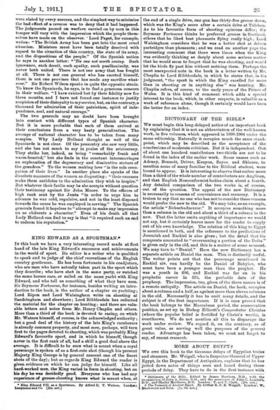DICTIONARY OF THE BIBLE.*
WE must begin this long-delayed notice of an important book by explaining that it is not an abbreviation of the well-known work, in five volumes, which appeared in 1898-1904 under the same editorship. Naturally it occupies much the same stand- point, which may be described as the acceptance of the conclusions of moderate criticism. But it is independent. Oat of about one hundred contributors two-thirds are not to be found in the index of the earlier work. Some names such as Adeney, Bennett, Driver, Kenyon, Sayee, and Skinner, to mention some of many familiar to the Biblical student, were bound to appear. It is interesting to observe that rather more than a third of the whole Lumber of contributors are Anglican, and that English Nonconformist bodies claim about a fourth. Any detailed comparison of the two works is, of course, out of the question. The appeal of the new Dictionary is necessarily to reasons of convenience and economy. It is a truism to say that no one who has not to consider these reason* would prefer the new to the old. We may take, as an example, the article "Nebuchadnezzar." It occupies something more than a column in the old and about a third of a column in the new. That the latter omits anything of importance we would not say, but it certainly leaves more for the reader to supply out of his own knowledge. The relation of this king to Egypt is mentioned in both, and the reference to the predictions of Jeremiah and Ezekiel is also given; but the detail that his conquests amounted to "overrunning a portion of the Delta" is given only in the old, and this is a matter of some moment. We may turn to "Daniel." Here the new Dictionary has a. separate article on Daniel the man. This is distinctly useful. The writer points out that the personage mentioned in Ezekiel xiv. can hardly be the Daniel of Babylon, who must have been a younger man than the prophet. He was a youth in 606, and Ezekiel was far on in his prophetic career in 595, the probable date of the prophecy. The impression, too, given of the three names is of a remote antiquity. The article on Daniel, the book, occupies about a column and a half, as against more than eleven columns in the old. Necessarily it has to omit many details, and the subject is of the first importance. If it is once proved that the book belongs to the Maccabean period, the conservative positica, as set up in Bishop Ellicott's Comprobator Christus (where the popular belief is fortified by Christ's words), is. overthrown. We do not mention all this to disparage the work under review. We regard it, on the contrary, as of great value, as serving welt the purposes of the general reader. Advantage has been taken, we must not forget to say, of recent research.














































 Previous page
Previous page